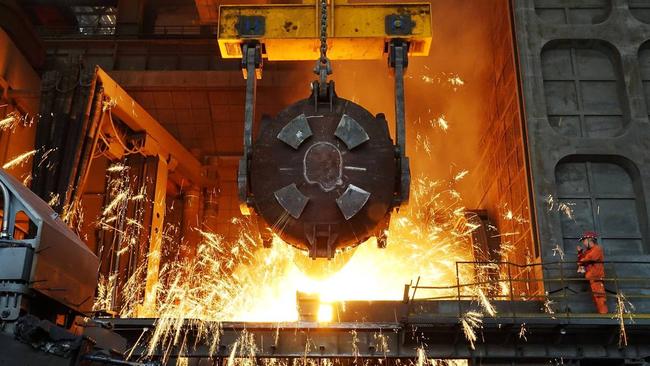Iron ore trade the economic powerhouse for Australia
The iron ore trade between Australia and China is worth more than $45 billion a year.

At the Shangri-La hotel in the Chinese port city of Dalian last week, representatives from Australia’s big iron ore companies were in an intense round of meetings with their biggest customers — the giant steel mills of China.
Representatives of BHP, Rio Tinto, Fortescue Metals and Gina Rinehart’s Roy Hill, were at the annual China International Steel & Raw Materials Conference- along with their biggest rival, Brazilian iron ore giant Vale.
While Australian treasurers pat themselves on the back for delivering more than 23 years of uninterrupted economic growth, the reality is one of the most important single factors driving the country’s economic success has been the commerce between sellers of Australia iron ore and the Chinese steel mills. Australia supplies 62 per cent of China’s seaborne iron ore, a trade worth more than $45 billion a year.
Iron ore remains Australia’s biggest single export, well above tourism, agriculture and services- to China, our biggest single trading partner, which buys more than $90bn of our goods and services each year. It’s a long way from the heady days of 2011 when iron ore was selling at more than $US190 a tonne, with the benchmark price now about $US68 a tonne.
It’s a relationship which has weathered serious strains, culminating in the imprisonment of former Rio executive Stern Hu, released in July after nine years in jail, but the ongoing strength of the relationships that were being nurtured last week is critical to Australia’s economic prosperity.
While the China focus from Australia is often on the bright lights of big cities like Shanghai and Beijing, it is cities such as Dalian where serious business is done.
While relations between Australia and China were strained under the Turnbull government, those at the coal face of the Australia-China business relationship are hoping the shift to Prime Minister Scott Morrison will provide the opportunity to reset the tone of the relationship.
Malcolm Turnbull’s comments, clumsily trying to use a quote from Chairman Mao to justifying imposing tighter security legislation, and comments by former foreign minister Julie Bishop about the importance of democracy in economic growth, were irritants in a broader deterioration of relations between Canberra and Beijing.
Australia, like other countries around the world, is struggling to come to terms with a more outspoken, nationalistic China under President Xi Jinping, which is far quicker to stake out its claims in a new world order and defend its interests than ever before.
But it also needs to have leaders who can navigate the complexities of the relationship so crucial for the country’s economy.
Some resetting of the relationship was already underway with Turnbull’s speech to the University of NSW last month. But with a new prime minister, and a new treasurer and foreign minister, there is a potential to improve all important political ties with Beijing before they have any negative impact on the trade relationship.
Donald Trump’s trade war with China has been a reminder that Australia’s ally, the US, can be unpredictable as well as powerful, with Australia having only a small seat at its negotiating table despite huge personal goodwill between Australians and Americans.
One way or another, Trump’s attacks on China and his threats to impose tariffs on all $US500 billion-plus worth of Chinese exports to the US, will inevitably have an impact on Australia through its critical ties with China.
Australia’s economic success is closely linked with both the ongoing strength of the Chinese economy and the ongoing strength of its working diplomatic relationship with China. China’s steel industry has been doing well, stronger than it has been for the past decade after going through some painful restructuring over the past few years as the government has shut down small, illegal, polluting players and is pushing the industry towards larger, modern, more efficient, more environmentally-friendly production plants.
But as Liu Zhenjiang, the secretary-general of the China Iron and Steel Association, pointed out in his speech last week, the level of optimism currently seen in the industry this year cannot expect to continue into next year in the face of the trade wars.
If anything, he said, next year would see downward pressure on economic growth in China.
A fall in the profits of the Chinese steel industry will inevitably flow thorough to its demand for Australian iron ore.
Last week in Dalian was not a place for striking new deals, but as Liu said it was about maintaining long term, enduring relationships between both sides — iron ore sellers and Chinese buyers — in the face of a “world economic order with troubles and challenges invented deliberately”.
The Donald Trump-inspired trade war with China has opened up space for improvement in Australia’s political ties with China.
“Both Australia and China have prospered by being more open to trade and investment,” said
Australia’s Ambassador to China, Jan Adams.
“It is no surprise that Australia and China stand together opposing protectionism, supporting the World Trade Organisation and the principles of trade and investment liberalisation.”




To join the conversation, please log in. Don't have an account? Register
Join the conversation, you are commenting as Logout